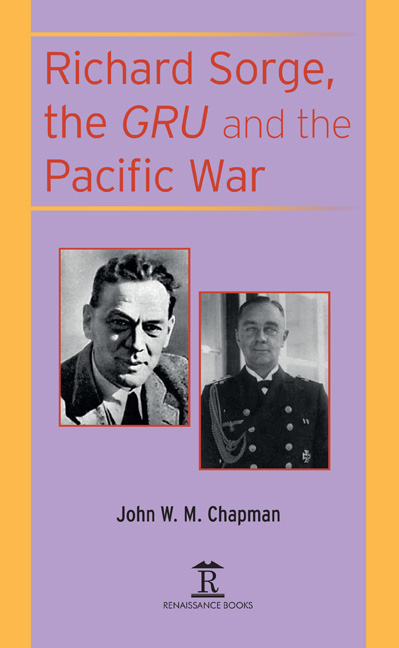Book contents
- Frontmatter
- Contents
- Chart: Organization of the People’s Commisariat for the Defence of the USSR,1941
- Preface
- Introduction
- Abbreviations
- List of Illustrations
- 1 ‘All is Not Well in the Camp of the Axis Powers’: Karl von Wiegand to Hearst Press, 20 November 1941
- 2 ‘In the Matter Affecting Ambassador Ott’
- 3 The Purge of German Journalists
- 4 ‘Expressions which are Psychologically Dangerous’: General Jodl to Admiral Wenneker 24.12.1942
- 5 The Bifurcation of Intelligence in Retrospect, 1929–1937
- 6 The Bifurcation of Intelligence in Retrospect, 1937–1941
- 7 Conclusions
- Select Bibliography
- Source Materials
- Index of Persons
- Index
- List of Contributors
2 - ‘In the Matter Affecting Ambassador Ott’
Published online by Cambridge University Press: 05 October 2022
- Frontmatter
- Contents
- Chart: Organization of the People’s Commisariat for the Defence of the USSR,1941
- Preface
- Introduction
- Abbreviations
- List of Illustrations
- 1 ‘All is Not Well in the Camp of the Axis Powers’: Karl von Wiegand to Hearst Press, 20 November 1941
- 2 ‘In the Matter Affecting Ambassador Ott’
- 3 The Purge of German Journalists
- 4 ‘Expressions which are Psychologically Dangerous’: General Jodl to Admiral Wenneker 24.12.1942
- 5 The Bifurcation of Intelligence in Retrospect, 1929–1937
- 6 The Bifurcation of Intelligence in Retrospect, 1937–1941
- 7 Conclusions
- Select Bibliography
- Source Materials
- Index of Persons
- Index
- List of Contributors
Summary
IT WAS AT this point on 27 March 1942 that Ribbentrop himself intervened by firing off a cable directed personally to Ott in which he called for a full report on relations between Sorge and the Embassy and on the extent, if any, there might have been breaches of Japanese confidence. It was important, said Ribbentrop, that he had to be in a position to fend off criticisms of the Foreign Ministry arising from the circulation of the allegations to the armed forces. But he said nothing about the notification of the German police that had already added to the complexity of the issue in domestic politics, though he wanted to know how Sorge's Communist past had been overlooked to the extent that Sorge could obtain membership of the Nazi Party without adequate checks and pointed to the use made by Sorge of support from members of the Embassy to obtain a closer connection with the Frankfurter Zeitung.
The fact that Ribbentrop specifically asked Ott to look into the inaccuracies in Lissner's report provided Ott with an open invitation to highlight all the contradictions which could be identified that might cast doubt on the authenticity of the allegations. He denied, firstly, that Sorge had been tried and condemned and cast doubt on claims mentioned by Lissner about the involvement of the Japanese Navy in dealings with the Russians, but made no comment about Lissner's praise for the work of Admiral Wenneker in rescuing good relations. Ott rebutted Lissner's claim that Sorge was ever party to continuous briefing by Embassy officials, indicating that information – mostly reliable - had been received by the military, air and former naval attachés from Sorge and was based on what had been learned from Japanese sources in the style of effective professional journalism. Ott pointed to having made reports in the summer of 1941 based on points that Sorge had claimed to have picked up from political circles round Prime Minister Konoe.
- Type
- Chapter
- Information
- Richard Sorge, the GRU and the Pacific War , pp. 15 - 26Publisher: Amsterdam University PressPrint publication year: 2020

